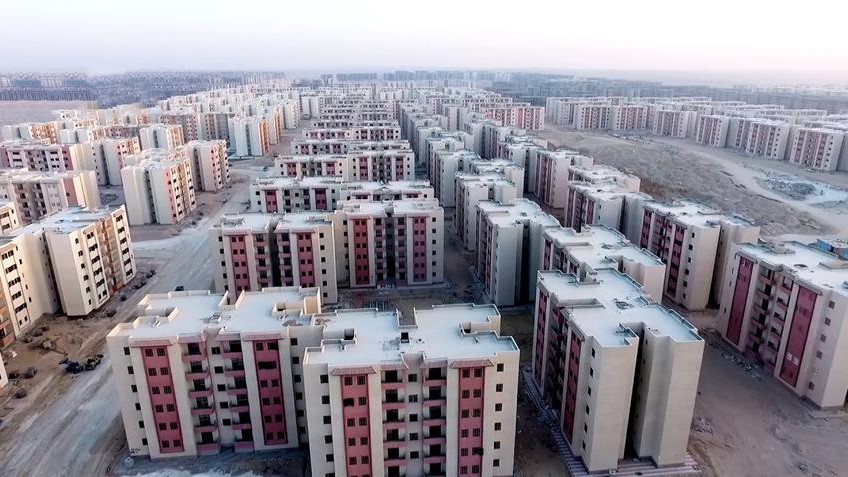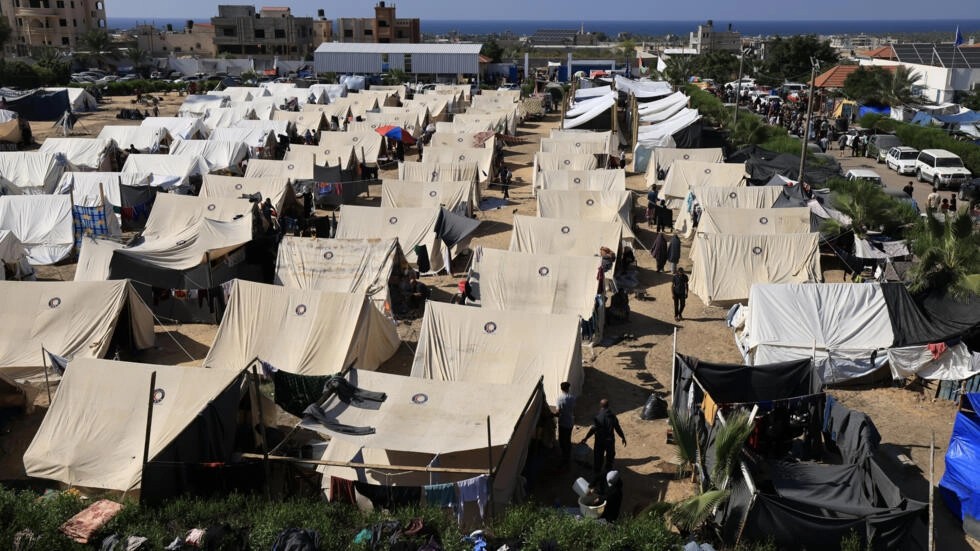Israel-Palestine war: Proposals to push Gaza's Palestinians into Egypt stoke fear of settler replacement

Two Israeli proposals to move Palestinians out of the Gaza Strip and into Egypt have stoked fears of a second Nakba, as the Israeli military pummels the coastal enclave with air strikes.
Since the 7 October Hamas-led attack on Israeli communities near Gaza, which killed around 1,400 people, mainly civilians, anti-Palestinian rhetoric and sentiment has been at an all-time high.
Israel has responded by waging a relentless bombing campaign on Gaza, warning everyone in the coastal enclave's north to move south towards the Egyptian border.
Various Israeli officials and prominent figures have talked up the idea of ridding Gaza of the 2.3 million Palestinians there, provoking Egyptian President Abdel Fatah el-Sisi and Jordan's King Abdullah II to warn against such plans.
Though such a move has not been promoted by Prime Minister Benjamin Netanyahu's government as actual policy, people within or close to it have nonetheless apparently drawn up detailed plans to consider.
New MEE newsletter: Jerusalem Dispatch
Sign up to get the latest insights and analysis on Israel-Palestine, alongside Turkey Unpacked and other MEE newsletters
Israeli daily Calcalist reported on one proposal drawn up by Israel’s Minister of Intelligence Gila Gamliel, where she recommended to the cabinet the transfer of Gaza residents to the Sinai in Egypt after the war.
The document seen by Calcalist reportedly includes the intelligence ministry's logo and was passed around ministries for consultation. It was leaked to a settler movement known as Settlement Headquarters - Gaza Strip, which campaigns for settlements to be re-established in the territory. Israel removed its settlers from Gaza in 2005.
The Israeli daily noted that ultimately it may not affect government policy but that it was possible that it had been drafted to “give support” to the “extreme settler movement”.
‘Tent cities in the Sinai’
Gamliel’s report says the best possible outcome following Israel’s war "that will yield positive and long-term strategic results" is the transfer of Gaza's Palestinians to the Sinai Peninsula.
The move would be in three stages. The establishment of tent cities in Sinai southwest of the Gaza Strip, establishing a so-called humanitarian corridor through which Palestinians would be allowed to flee, followed by the construction of cities in northern Sinai.
Finally, Israel would then establish a no-man's land several kilometres deep within Egyptian territory to ensure that Palestinians would not be able to return.
The paper also calls for cooperation between Israel, Arab and European countries to also take in displaced Palestinians.
In a separate report released by the Misgav Institute for National Security & Zionist Strategy, an Israeli think tank, looks at the economic viability of transferring Gaza’s population to the Sinai.
Follow Middle East Eye's live coverage for the latest on the Israel-Palestine war
Titled “A plan for resettlement and final rehabilitation in Egypt of the entire population of Gaza: economic aspects” the report initially circulated on X, formerly known as Twitter, has since been taken down.
“There is currently a unique and rare opportunity to evacuate the entire Gaza Strip in coordination with the Egyptian government,” said the report written by Amir Weitmann, a researcher at the Misgav Institute.
'There is currently a unique and rare opportunity to evacuate the entire Gaza Strip in coordination with the Egyptian government'
- Amir Weitmann, Misgav Institute
The Misgav Institute is headed by the former Israeli national security adviser, Meir Ben-Shabbat, who is also considered one of the architects of the normalisation deals Israel signed with the UAE, Bahrain and Morocco in recent years.
Ben-Shabbat is also believed to be close to Israel’s intelligence community and worked for 30 years in the Shin Bet, Israel’s internal security services.
The document argues that it has devised a “sustainable and economically feasible” plan to expel Gaza’s population that also aligns with the “geo-political interests” of Israel, Egypt, Saudi Arabia and the US.
The paper suggests that Palestinians could be housed in the two largest satellite cities of Cairo, 6 October and 10 Ramadan. Both locations are named after the 1973 war against Israel, whose 30-year anniversary was the day before the Palestinian attack.
According to the report, there are enough apartments to house six million people, which are largely empty because ordinary Egyptians are unable to afford the units.
With each housing unit costing around $19,000, the report estimates that the cost of housing Gaza's Palestinians in the Cairo suburbs would be as much as $8bn.
The value represents as much as 1.5 percent of Israeli GDP, which can “easily be financed” by the state, the report added.
The report argues that the dire state of the Egyptian economy could convince Cairo to consider the offer. If needed, Israel could even consider raising as much as $32bn to convince Egypt to acquiesce to the project, it added.
'Gaza would provide high-quality housing for many Israeli citizens'
- Misgav Institute paper
“This is an innovative, cheap and sustainable solution,” said the report, adding: “Over time this is actually a very worthwhile investment for Israel" and that "Gaza would provide high-quality housing for many Israeli citizens”.
Israel’s “investment” in Egypt would serve Europe also by stabilising the country’s economy and helping to stem the migration tide, it argued.
Saudi Arabia could also benefit from the proposal, adds the report.
Firstly, since Israeli actions in Gaza regularly inflame tensions in the Arab world, removing Palestinians would allow “the promotion of peace with Israel without the incessant interference of local public opinion”.
Secondly, the report noted Gaza’s population could be hired by Saudi Arabia as cheap labour to work on construction projects throughout the country, including the building of the flagship Neom project.
The report concluded that it’s not clear when the next opportunity to ethnically rid Palestinians from Gaza would arise and therefore the “time to act is now”.
Treat with caution
An Israeli analyst, who wished to remain anonymous for security reasons, told Middle East Eye that such plans should be treated with extreme caution.
“Despite the natural instinct to treat such papers with extreme concern in times of such a crisis, I would not,” the analyst said.
“They represent the fantasies of extremely marginal groups, I would almost say sects, and the Israeli government now is focusing exclusively on military strategy and is more compliant than ever with US demands and constraints.”
The Israeli war cabinet includes centrist figures like Benny Gantz and Gadi Eizenkot “who have no illusions about the madness of plans such as these vis-a-vis Egypt,” added the analyst.
Israel's call for half of the Gaza Strip's population to leave their homes and head to the southern portion of the strip has also heightened fears in Egypt of a massive influx of refugees into Sinai.
According to reports, the Egyptian government told a European diplomat: "You want us to take one million people? Well, I am going to send them to Europe. You care about human rights so much - well, you take them."
According to the Israeli analyst, there's more concern to be had over Palestinians being expelled from their homes in the occupied West Bank by settlers than "something like this, which cannot be done without Egyptian consent and international legitimacy, of which there will be none”.
MEE has asked the US State Department, the UK Foreign, Commonwealth and Development Office, and the office of Josep Borrell, the EU's head of foreign affairs, for comment on the proposals.
This article is available in French on Middle East Eye French edition.
Middle East Eye delivers independent and unrivalled coverage and analysis of the Middle East, North Africa and beyond. To learn more about republishing this content and the associated fees, please fill out this form. More about MEE can be found here.






